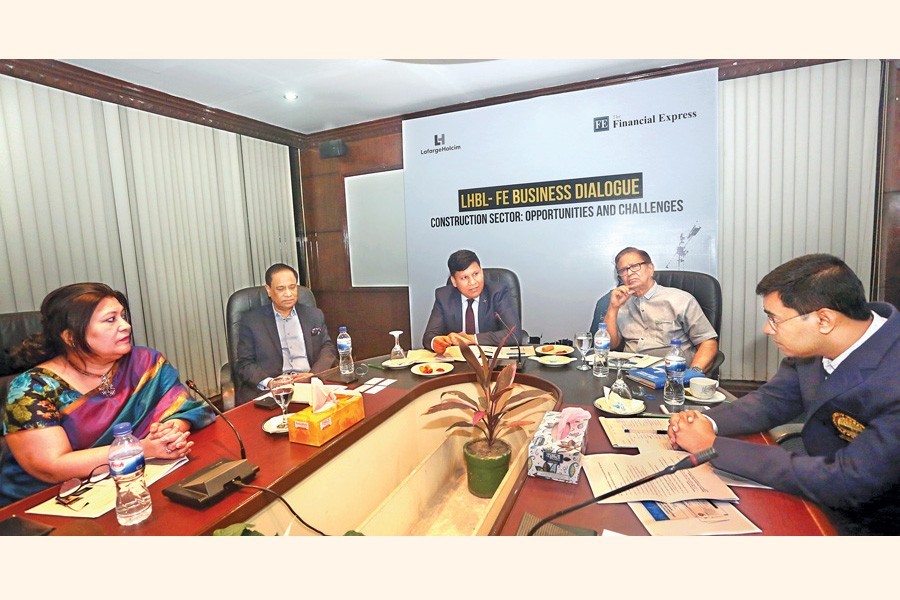LafargeHolcim Bangladesh CEO Rajesh Surana addressing LHBL-FE Business Dialogue on "Construction Sector: Opportunities and Challenges" at a convention centre in the city on Wednesday. The Financial Express Editor Shah Husain Imam was present on the occasion, among others — FE photo
Quality assurance remains a key challenge for the country's construction industry, say experts at a roundtable dialogue.
The lack of required technical knowhow and the soaring prices of construction materials also stand in the way of quality construction, they have said.
The experts' comments came at the dialogue on 'Construction Sector: Opportunities and Challenges' held in the city on Wednesday.
LafargeHolcim Bangladesh in collaboration with the Financial Express organised the dialogue.
"There is considerable amount of confusion and lack of technical knowledge when it comes to the construction sector in the country," said Toufiq M. Seraj, managing director of Sheltech, a leading real estate firm.
"At the same time, there is lack of supervision or monitoring by the authorities to ensure quality," he said as he presented the keynote.
Mr Seraj also identified the rising price of construction materials as an impediment to quality construction in the country.
For, people tend to opt for lower quality material.
"We have found that infrastructure development in Bangladesh is costlier compared to most other developing countries in the world," he said.
Turning to the issue of construction safety, he laid stress on improvement in this area.
From 2005 through 2017, a total of 1,536 deaths were reported at construction sites, working out to an average of 105 such casualties a year, according to the keynote presentation.
Highlighting the importance of quality of construction materials, Mr. Seraj said, "Although the initial expenses for quality products are a bit high, long term advantages are quite substantial."
Speakers at the event emphasised better training of construction workers and engineers while reducing pressure on big cities such as Dhaka and Chittagong for the healthy growth of the construction sector.
In his intervention, editor of The Financial Express Shah Husain Imam said, "While the real estate sector is making increased contribution to the GDP (gross domestic product) growth, the cost of materials and the subsequent escalated cost of construction is undercutting some of the growth as well."
"So it is important to quantify how much is added and how much is deducted from the GDP through this process," he added.
The FE editor also called for mutual dialogue between the regulators and other actors of the construction sector for smooth and sustainable growth of this industry.
Speakers at the event noted that with a booming economy and rapid urbanisation, the construction industry is bound to grow substantially in the country in the coming years.
Currently, 30 per cent of Bangladesh's population lives in Dhaka and Chittagong, said Rajesh Surana, chief executive officer of LafargeHolcim Bangladesh.
"With a big boom in power and infrastructure, new cities and townships have to be built, which means more and more quality construction materials should be available," said Mr Surana.
"Although, we have used brick for hundreds of years- the disadvantage of brick is that it is not environment-friendly," said QM Shahed, CEO of Partex Complex-2.
"Bricks take away a huge amount of top soil while a lot of trees have to be cut for burning bricks. So, we have to look for alternative to bricks," he said.
Citing an earlier study, managing director of Berger Paints Rupali Chowdhury said that some two to three per cent of the GDP is wasted because of the non-preservation of the fixed assets.
"In Bangladesh, there is a perception that the purpose of outer coating of the structures is only aesthetic. But that mindset has to change", she said.
"We have to understand that outer coating is important for the preservation of fixed assets," she added.
Project director of Ashrayan Project of the Prime Minister's Office Mamun Chowdhury, in his speech, argued that the increased use of hollow blocks can be a possible solution to the rising cost of construction materials.
"Since our land is limited, we should really go for condominiums as high as 60 or 70 storied in our urban areas to accommodate more people within this small space," said managing director of BTI F R Khan.
Managing director of Building for Future Tanveer ul Haque Probal, in his speech, called for tax rebate on materials used for private construction.
Professor of Bangladesh University of Engineering and Technology M Mostafa Ali, who moderated the discussion, said finding skilled construction engineers is a major challenge for quality construction schemes in the country.
"Ideally, there should be a separate discipline called construction engineering in the engineering universities like BUET," he said.
Internship should also be made mandatory for the young engineering graduates from public universities, the experts said.
They also placed importance on awareness building to develop a culture of construction safety in Bangladesh.


